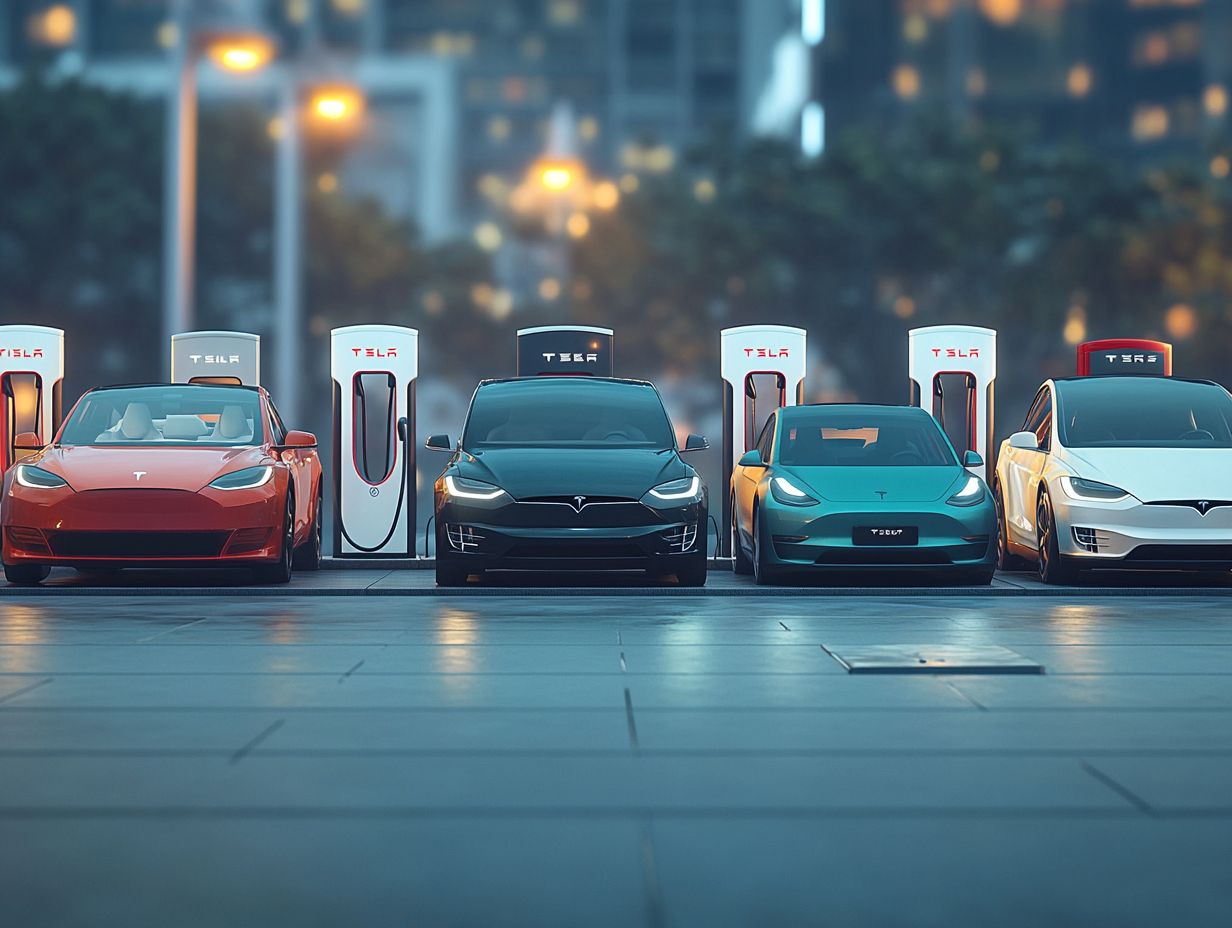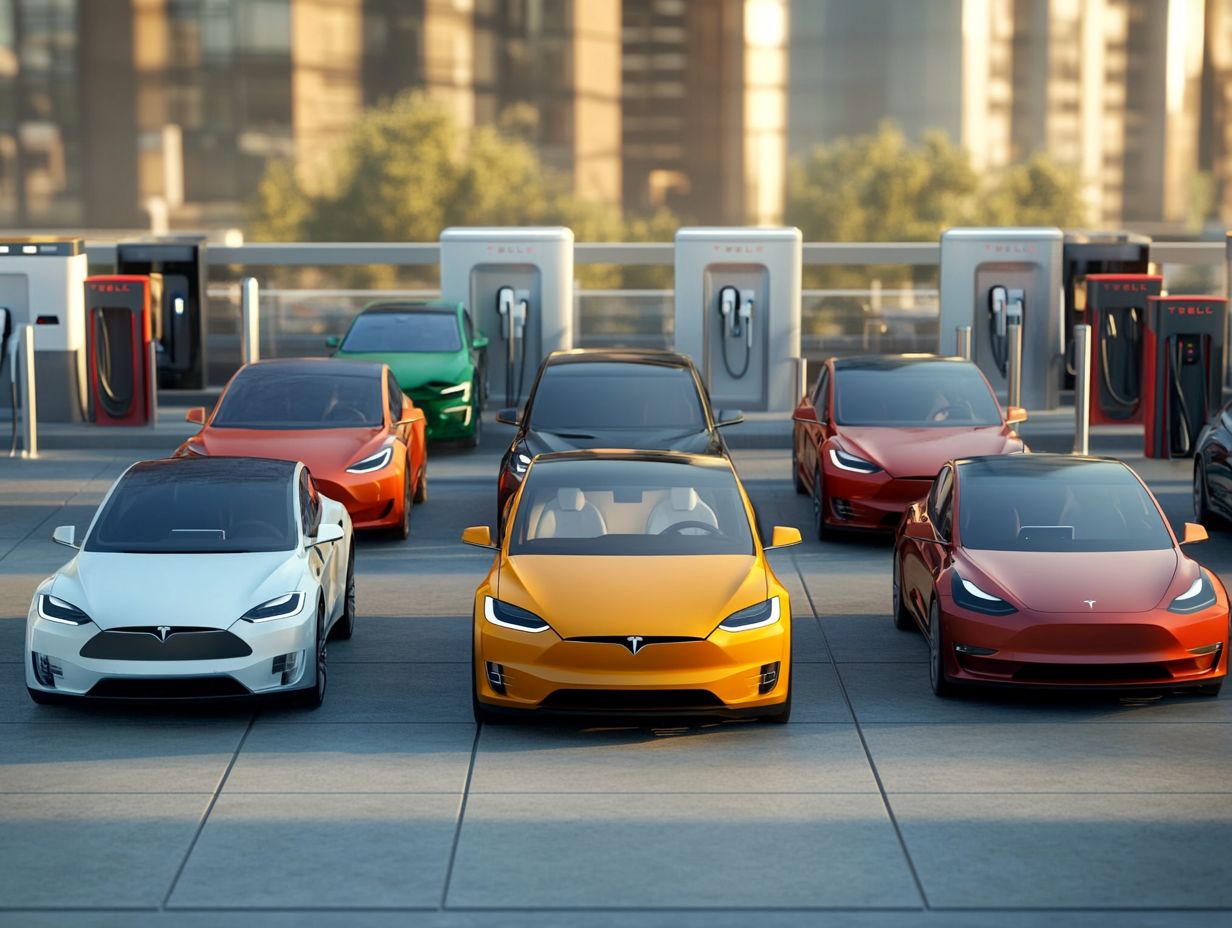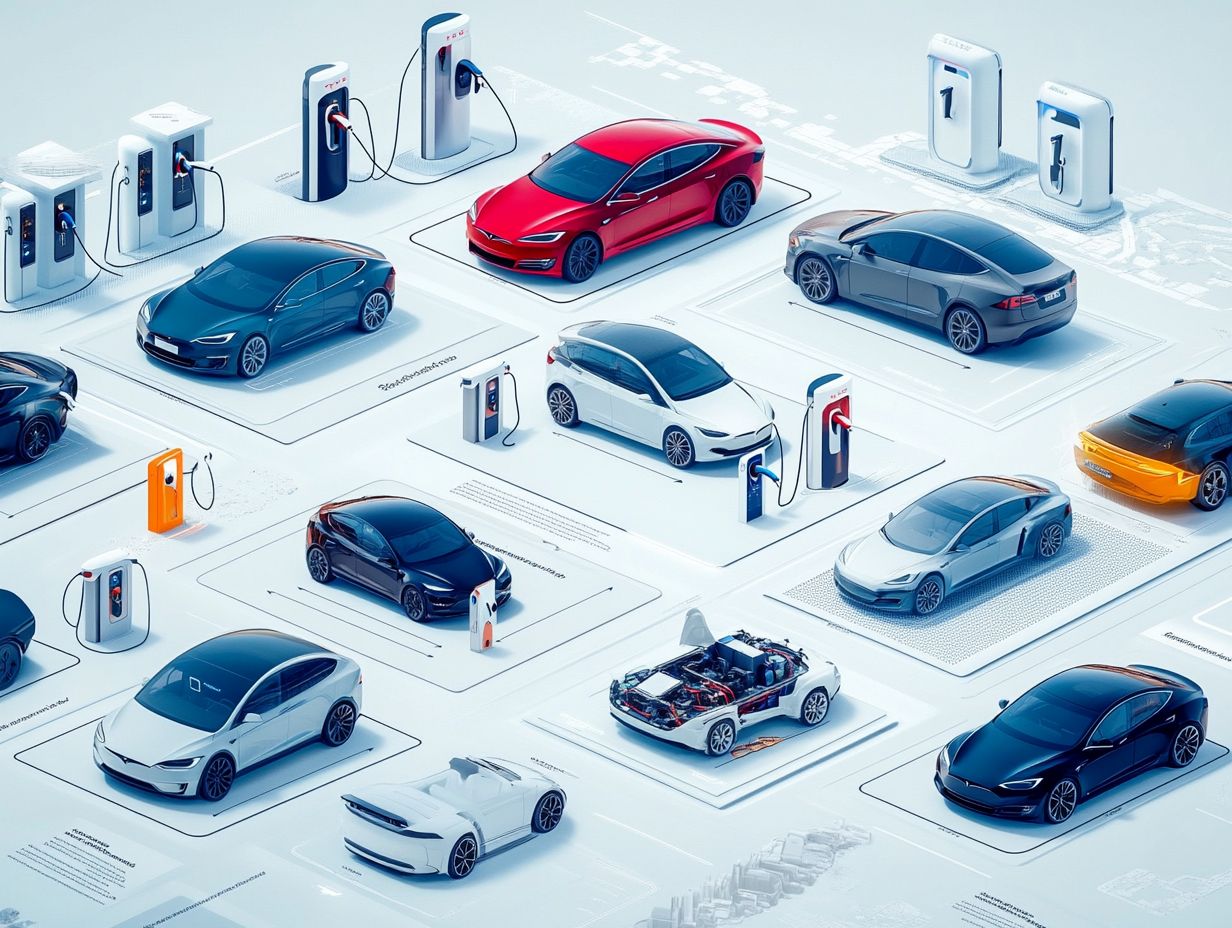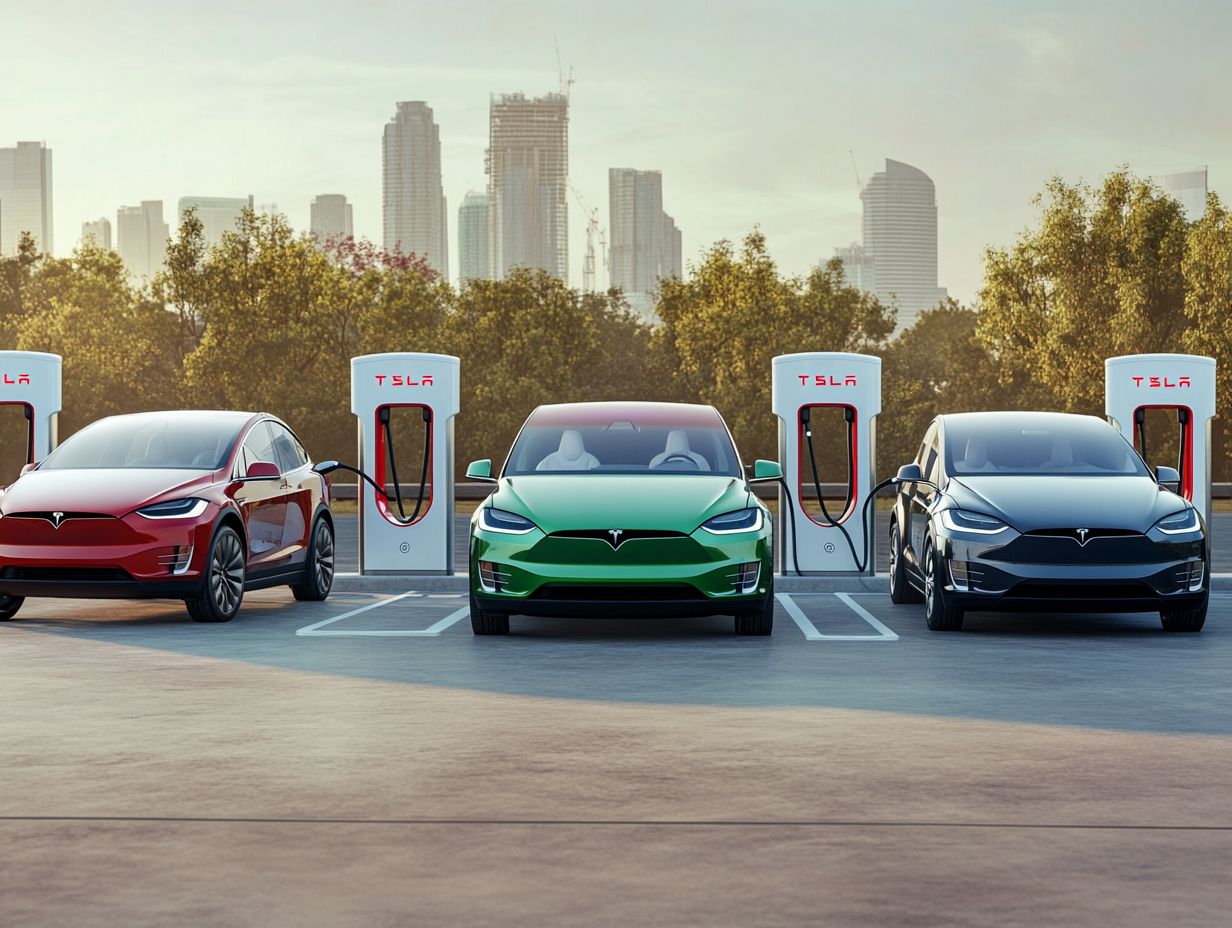How to Understand EV Model Comparisons
As electric vehicles (EVs) gain traction and captivate the market, grasping the intricacies of various models becomes essential for you as a prospective buyer.
This article delves into the critical factors you should weigh when comparing EV models, including range, battery life, and charging options.
With valuable insights into popular contenders like the Tesla Model S and Chevrolet Bolt, you’ll be well-equipped to navigate the ever-evolving electric vehicle landscape.
Uncover the unique features that set each model apart and determine which one aligns perfectly with your lifestyle.
Contents
- Key Takeaways:
- Factors to Consider in EV Model Comparisons
- Popular EV Models and How They Compare
- Frequently Asked Questions
- What is an EV model comparison?
- Why is it important to understand EV model comparisons?
- What are some key factors to consider in EV model comparisons?
- How can I access EV model comparisons?
- Are there any specific EV model comparison tools or resources available?
- How often should I review EV model comparisons?
Key Takeaways:

- When comparing EV models, consider factors such as range, charging options, performance, and price.
- The Tesla Model S and Chevrolet Bolt offer similar range, but the Model S has a longer battery life, while the Bolt has a lower price.
- The Nissan Leaf is more affordable than the Hyundai Kona Electric, but the Kona has a longer range and faster charging time.
What is an EV Model?
An Electric Vehicle (EV) model represents a particular configuration of a vehicle that uses alternative fuel sources, mainly electricity, instead of traditional fossil fuels. This includes models like Plug-in Hybrid Electric Vehicles (PHEVs) and Battery Electric Vehicles (BEVs).
These innovative vehicles integrate the latest technology, such as electric motors and gasoline engines, to enhance performance, reduce emissions, and offer a sustainable transportation solution.
Given rising concerns about air pollution and climate change, familiarizing yourself with the various EV models available can significantly influence your choices and the broader environmental impact of transportation.
PHEVs combine an internal combustion engine with an electric motor, allowing you to switch between gasoline and electric power. This enhances flexibility and reduces your overall carbon footprint. In contrast, BEVs operate solely on electric energy, proudly producing zero tailpipe emissions a feature that resonates well with eco-conscious consumers like you.
Recent advancements in technology have improved battery efficiency and decreased charging times, effectively tackling one of the major hurdles to EV adoption: range anxiety. The growth of charging infrastructure, including rapid chargers and city-wide stations, is vital for helping both PHEV and BEV users travel farther with confidence.
This change brings us closer to a cleaner, more sustainable transportation future.
Why Compare EV Models?
Comparing various EV models is crucial for you, especially if you’re considering a shift to electric vehicles. It allows you to evaluate your unique needs and preferences in the rapidly evolving electric vehicle market.
By assessing factors such as cost of ownership, features, and performance metrics, you can make informed choices that truly align with your lifestyle and budget. See how different models compare, which highlights the top contenders and alleviates concerns about range anxiety a common hurdle for many potential buyers.
Comprehensive guides are invaluable in this decision-making journey, offering detailed insights and comparisons that enable you to feel more confident about your electric vehicle investment. With so many options available, having access to curated information helps you navigate the complexities of the electric vehicle landscape with clarity and assurance.
Factors to Consider in EV Model Comparisons
When comparing EV models, it’s essential to consider several key factors. These include technological advancements, charging options, performance indicators, and driving range.
Each of these elements plays a significant role in shaping how well the car works and its overall desirability.
Explore various EV models and make informed decisions based on the insights provided to find the perfect fit for your lifestyle.
Range and Battery Life

Range and battery life are crucial factors in the performance of your electric vehicle. They dictate how far you can travel on a single charge, addressing the ever-present concern of range anxiety.
These elements are essential when considering which model to invest in. Take the Tesla Model 3, for instance; it offers an impressive range of up to 358 miles. The Ford Mustang Mach-E showcases a range between 224 and 312 miles, depending on the variant you choose.
The latest advancements in battery technology, like solid-state batteries a new type of battery that can provide longer ranges and faster charging promise to push these ranges even further. This makes electric vehicles more viable for long-distance journeys.
As the network of charging stations continues to expand, your confidence will undoubtedly grow. This shift is sparking excitement, encouraging more drivers to join the electric revolution!
Charging Options and Time
Charging options and time are crucial factors for you as a potential EV owner. They significantly impact the convenience and practicality of your electric vehicle experience.
With a range of choices at your fingertips including home charging stations, public charging networks, and rapid charging solutions like the EVgo L2 charger you can select the option that aligns perfectly with your lifestyle.
Home charging typically provides exceptional convenience, allowing you to recharge overnight while you sleep. For longer journeys or for individuals without a dedicated home setup, public charging stations are a boon.
Fast charging options, such as the EVgo L2, can dramatically reduce downtime. This makes road trips not just possible but enjoyable! A strong charging infrastructure enhances your driving experience and ensures you feel secure about charging, easing any range anxiety.
Performance and Handling
The performance and handling of EV models are crucial metrics that dictate how well they perform under various driving conditions. They are significantly influenced by vehicle weight and cutting-edge technological advancements.
These elements play a vital role in shaping your overall driving experience, affecting everything from acceleration to cornering capabilities. You ll find that lighter models often showcase superior agility, enabling sharper turns and improved responsiveness.
Innovations like regenerative braking and adaptive suspension systems enhance both stability and control. This ensures that your vehicle remains poised even at higher speeds.
By integrating these forward-thinking technologies, manufacturers strive to craft a more enjoyable ride. They seamlessly blend efficiency with performance, allowing you to relish the thrill of the road while maintaining your commitment to environmental responsibility.
Price and Affordability
Price and affordability are pivotal factors in your decision-making process when considering the purchase of an electric vehicle. This encompasses not only the initial estimated prices but also the long-term cost of ownership.
As you explore various models entering the market, you’ll encounter a wide spectrum of estimated prices influenced by elements like brand reputation, battery technology, and vehicle specifications. For example, luxury electric cars tend to carry a heftier price tag compared to more budget-friendly options.
It s crucial for you to look beyond the sticker price and factor in ongoing expenses associated with insurance, maintenance, and charging.
Federal tax credits can significantly enhance affordability. Don’t miss out on these amazing credits that can make going electric more affordable! These incentives elevate the overall value proposition of electric vehicles, encouraging many drivers, including yourself, to embrace greener alternatives.
Popular EV Models and How They Compare

In the rapidly expanding electric vehicle market, several popular EV models stand out. Each boasts unique features and performance characteristics that invite closer scrutiny and detailed comparisons.
Tesla Model S vs. Chevrolet Bolt
The Tesla Model S and Chevrolet Bolt are titans in the electric vehicle arena. Each excels in performance metrics, such as driving range and cost of ownership.
If you lean towards the Model S, prepare for a high-end experience featuring remarkable acceleration and an impressive driving range. If practicality and budget are priorities, the Bolt is an excellent choice, delivering electric capability without breaking the bank.
The price disparity between these models is significant. The Chevy is a more accessible option for many families. However, if you re ready to invest in the luxury and advanced features that the Tesla offers, you’ll enjoy cutting-edge technology and a certain status that comes with ownership.
Ultimately, each vehicle appeals to different buyer demographics, catering to those who value either performance and luxury or affordability and everyday usability.
Nissan Leaf vs. Hyundai Kona Electric
When weighing options between the Nissan Leaf and Hyundai Kona Electric, consider their environmental impact, technological advancements, and overall efficiency.
Both vehicles offer impressive electric ranges and eco-friendly attributes. However, their distinct battery technologies can sway your decision. The Leaf features a robust battery system known for its longevity, appealing to those who value reliability.
The Kona Electric offers faster battery charging and improved energy storage. Each model boasts unique technological features that elevate the driving experience.
While one might excel in smart connectivity, the other shines with driver-assistance systems designed to enhance safety on the road. Understanding these nuances will help you make an informed choice that fits your needs and lifestyle.
Ford Mustang Mach-E vs. Audi e-tron
The Ford Mustang Mach-E and Audi e-tron showcase distinctly different philosophies in electric vehicle design. Each targets unique market segments with its performance metrics and luxury features.
The Mach-E brings a thrilling, sporty feel to your drives! It appeals to those who crave an exhilarating experience while appreciating practicality.
In contrast, the e-tron embodies opulence and comfort, attracting consumers who prioritize sophistication and high-quality materials. In performance, the Mustang excels in acceleration, delivering thrilling torque.
The Audi emphasizes a smooth, serene ride, reinforcing its identity as a luxury contender in the EV market. With each vehicle presenting its own distinctive attributes, you can select the one that best aligns with your lifestyle and preferences.
Frequently Asked Questions

What is an EV model comparison?
An EV model comparison assesses and evaluates different electric vehicle models based on their features, performance, and other key factors to find the best fit for your needs.
Why is it important to understand EV model comparisons?
Understanding EV model comparisons is crucial. It allows you to make an informed decision when purchasing an electric vehicle. This understanding helps you identify the strengths and weaknesses of each model and choose the one that fits your priorities.
What are some key factors to consider in EV model comparisons?
Key factors to consider include range, battery life, charging time, price, and available features. Prioritize these factors based on your personal needs and preferences.
Understanding these factors now will help you make the best choice when it s time to buy an electric vehicle!
How can I access EV model comparisons?
Access EV model comparisons through online reviews, car comparison websites, and car magazines. Visit dealerships to test drive different models for a firsthand experience.
Are there any specific EV model comparison tools or resources available?
Yes, many tools and resources are available online. Popular options include the US Department of Energy’s Fuel Economy website, Edmunds, and Consumer Reports. These platforms let you compare models side by side and provide detailed information.
How often should I review EV model comparisons?
Check EV model comparisons regularly to catch the latest innovations. This practice will help you make informed decisions when purchasing an electric vehicle.






